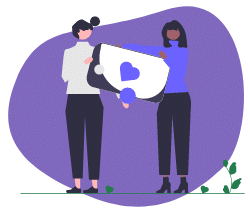This page provides the guidance and resources you need to build a safe future after you’ve left.
3A.
Use safe technology practices
Device and app safety
Your device can be a great tool to connect you to your support people or services. Follow these safe device tips to protect yourself and your information:
- Use Alternative Devices:
- Avoid using your current device for tasks that may aggravate your partner or put you at risk.
- Get a new basic phone using a prepaid service in your name.
- Use scanners at libraries, women’s services, or a trusted friend’s device to scan, photocopy, or email important documents.
- Lock and Protect Your Device:
- Set devices to lock immediately after the screen is turned off.
- Use strong passwords to lock your devices.
- If your phone has the option, use biometric security features like facial recognition and fingerprints for added security.
- Device Tracking:
- Use device tracking features (e.g., Find My iPhone, Find My Device) to locate your device if it goes missing. Ensure these features are set up and activated.
- Be aware your partner may use these features to track you.
- When necessary, leave your devices at home to avoid being tracked.
- Update Software:
- Software updates can provide security patches or enhanced privacy features to make your device more secure.
- Manage app settings:
- Review and manage the permissions granted to apps on your devices regularly. Limit access to sensitive data and features, such as your location, contacts, and camera.
- Some mobile apps save passwords or keep you logged into your accounts. Hide these apps from your device's home screen to make it harder to find these apps. For further instructions, see iPhone Life Magazine’s article.
- Backups:
- Regular Backups: Back up your data to a secure cloud service or external hard drive so you can access your important information, even if your device is compromised. Remember, if you have a family back-up account such as an iCloud your partner may be able to see your texts, images and other data from your device.
Instructional resources
- Women’s Technology Safety & Privacy – Instructions on how to increase technology safety and privacy via device settings
- Esafety Online Safety Checklist – Checklist to safely use technology
- 1800RESPECT Device Safety – Further safety tips
- Personal Safety Apps - Find a list of apps and resources for people experiencing abuse.
Check for spyware and tracking apps
Protect your devices from tracking apps, spyware, and scams to maintain your privacy. Spyware is malicious software that an abusive partner might install on your smartphone, computer, or tablet. This software monitors the device activities without your knowledge or consent.
Signs spyware is installed on your device include:
- The device battery dies faster than usual (although this can also be a sign of an ageing battery).
- Unknown programs are operating in the background of the device.
- The device is slower.
- Your partner knows about emails, texts and phone calls you make in private.
- A keylogger (devices that record keystrokes on a computer) is installed between the keyboard and the computer.
For further information on spyware, see Women’s Technology Safety & Privacy Toolkit.
Safer in the Home can inspect potential spyware technologies, including:
- Spyware on mobiles, iPads, computers and social media.
- Tracking devices on vehicles.
- Monitoring devices within the home, such as cameras and recording devices.
Identifying online scams
Although an abusive partner is unlikely to run a scam against you, it’s important to be aware of the risks so your financial capacity to leave the relationship is not impaired by scammers.
The main types of scams are:
- Scammers who pretend to be trustworthy organisations or individuals to get personal or banking information. Using this information, scammers steal money, commit identity fraud, or commit other crimes.
- A catfishing or dating scam is when someone poses a convincing online profile to start a long-distance relationship. Once the relationship is established, they often ask for money to handle an emergency.
For government-regulated alerts on current scams, see Scamwatch or Stay Smart Online.
Other Ways to Protect Your Devices
- Use reputable antivirus and anti-malware software on all your devices. Update this software regularly to protect against the latest threats.
- Monitor your devices for any unusual activity or apps you did not install. Look for signs of spyware or tracking apps.
- Regularly run security scans on your devices to detect and remove malicious software.
Keep your location safe online
Keeping your location safe is crucial to prevent your abuser from tracking your movements:
- Ask friends and family, including children, to avoid posting images that could give away your location on social media.
- Check for small unidentified electronic devices on your technology, car and child’s property.
- Speak to your dealership to turn off inbuilt GPS systems on your car.
- Disable location services on devices, including children’s, especially if they’re gifted from your partner.
- Only allow navigation apps to access location services temporarily. Learn how to do this on iOS devices with Apple.
- Check credit card or direct debit payments don’t reveal your location, i.e. gym memberships or petrol stations that list the location or branch of your purchase.
- Use an independent bank account or pay for things in cash.
- Search your full name on Google in quotation marks to see if your private information is online.
- Disconnect your devices and online accounts to family networks, such as iCloud or Google.
- Don’t save passwords or connect to previous accounts that could be linked to family networks.
For further information, see 1800RESPECT’s online accounts and app safety.
Social media privacy
Social media can be an important tool to help you stay connected to support networks. Learn how to keep your online profile private with eSafety.
- Only connect with ‘friends’ you can trust to not communicate with your ex-partner.
- Avoid mutual friends with your ex-partner. They may be able to track your activities via these friends.
- Adjust security settings to appropriate levels on every social media network.
- Don’t allow social media to link with search engines and other social networks; doing so will allow people you have blocked on different networks to view your profile.
- Always log out of accounts rather than closing the window. Use alias accounts.
- If required, create new social media accounts under different names, with uncompromised emails and passwords so you can communicate privately with friends.
- Don’t delete existing accounts to avoid raising suspicion.
Email Safety
When creating online accounts, you may need an email address. Creating a new email that you know your partner cannot access or monitor is good practice.
Create a new email account.
- Use free email services such as Google Mail.
- Avoid using your name as the email address (try something like [email protected] rather than [email protected]).
- Avoid linking email accounts or phone numbers that your partner monitors.
- Use a trusted friend’s email if needed for authentication purposes.
- Use this email when safety planning or when accessing important sites such as Centrelink or banks.
Reset passwords
- Reset old passwords and carefully consider passwords for all new accounts. Avoid using children's and pet’s birthdays, names, or personal words your partner may know.
- Try using two words with a number or symbol sequence in the middle (For example, ‘your76>toolkit’)
- You can keep passwords on a list stored at a friend’s house or use apps such as LastPass, LogMeOnce, and Dashlane.
Keep up old appearances and use old emails for day-to-day communications.


